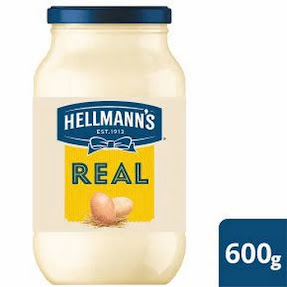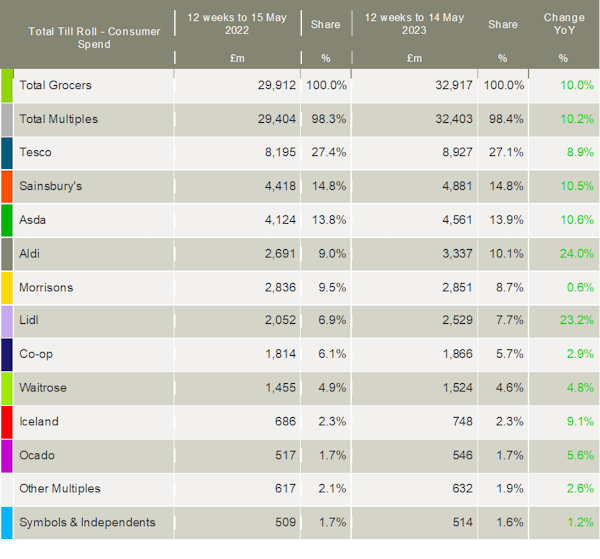Monday 5 June 2023
Retail Shrink in the New Norm...
However, the New Norm adds another dimension, the moral issue of adding to a cash-strapped shopper’s burden by the shame of arrest, coupled with the stigma for a leading retailer of prosecuting its customers vs. the growing problem of appearing to be soft on crime, all the subject of tabloid headlines on a slow news day.
Only yesterday in my local Co-op, I witnessed a shopper under observation by the checkout operator and a security guard as he pretended to self-check a small bag of groceries…
[NamNews readers will not need reminding that to fully appreciate the combined pressure on a retailer, think about the cost in incremental sales when a shopper steals a £3.50 tin of beans from a retailer on a 3% Net Margin, the retailer needs to make incremental sales of £116.67 to recover the loss…]
Like a formation dance-move, the Security Guard moved close to the shopper, murmured quietly in his ear, took the shopping bag as the shopper grimaced and quietly left the store, all without missing a beat...
A pointer for retailers everywhere !
#Shrink #Theft #Poverty #CashStrappedConsumers
Tuesday 23 May 2023
Proposed Contract Change To Hit Pay Of Asda Staff
 Around 7,000 Asda workers are facing a potential cut in their pay as the debt-laden supermarket group seeks further cost savings.
Around 7,000 Asda workers are facing a potential cut in their pay as the debt-laden supermarket group seeks further cost savings.
Asda’s owners, the Issa brothers and private equity firm TDR Capital, have been looking to make savings across the business after the cost of servicing the debt on their £7bn acquisition soared as interest rates rose. They are reportedly working on plans to merge the supermarket with their petrol forecourts business EG Group in a move designed to reduce their joint debt burden.
The GMB union claimed that those that do not agree to the pay change will have the new contract imposed on them and could be dismissed if they refuse to sign. The union, which represents many of the supermarket’s workers, stated that the proposed pay cut was “classic private equity slash and burn tactics” ahead of the potential £11bn merger with EG.
Nadine Houghton, GMB organiser, said: “Cutting the pay of 7,000 low-paid retail workers during a cost of living crisis is inexcusable.”
Houghton added: “These slash and burn tactics, along with food and fuel price increases, will only ramp up if the merger goes ahead.”
A spokesperson said: “We are holding a collective consultation in a small number of stores outside the M25 where colleagues are currently paid a legacy location supplement.
“This supplement is out of line with the wider retail market and has created an anomaly where some Asda colleagues in stores that are close together are paid different rates. As part of this consultation, we are discussing a compensatory payment for colleagues in return for the removal of this location supplement, if the proposal goes ahead.”
NamNews Implications:
- There could will be troubles ahead…
- Especially given the assumption that an unanticipated rise in interest rates from 1% to 4.5%+…
- …should be funded via workforce wages.
- Although this is a different business model, the JLP reduction/non-payment of bonus will be a big demotivator.
- …at least!
#Interest #DebtBurden #Inflation
Every little bit of availability helps…
Every little bit of availability helps…
(Tesco, Hove 1347 - Saturday 20/5/2023)
Leading Mayonnaise Brand Adopts Shrinkflation To Offset Higher Input Costs
According to trade publication The Grocer, Tesco has stopped selling 800g jars of Hellmann’s Real and Light mayonnaise that used to sell for £3.60. This has been replaced with a smaller 600g variant with a higher shelf price of £3.75.
The report noted that the move means the leading mayonnaise brand is now 37.8% more expensive per 100g than it was previously when sold in 800g jars.
A spokesperson for Unilever is quoted by The Grocer saying: “Our Hellmann’s Real Mayonnaise jars are available in four sizes to suit varying shopper preferences and needs. This includes our 600g jar, which is available alongside our 800g, 400g and 200g jars.
“Although we are currently experiencing significant increases in input costs, including the costs of the quality ingredients used to make Hellmann’s mayonnaise, we will always try to absorb as much of the cost pressure ourselves and look for savings within our own business before passing on pricing to consumers.”
NamNews Implications:
- Presumably, the price increases are being applied, pro rata across all sizes…
- i.e. the loyal Hellmann’s user is being asked to take a 38.7% price increase…
- …and has the options of switching to an alternative brand, an own label or a discounter.
- (interesting to assess the cost of retrieval for those that vote with their feet…)
Grocery Inflation Inches Lower
Despite recent suggestions that cost pressures are easing, latest Kantar data confirms that grocery price inflation remains exceptionally high.
However, it did fall for the second month in a row, inching down from 17.3% to 17.2% for the four weeks to 14 May. Take-home grocery sales rose by 10.8% on the same period as last year, with the discounters continuing to outperform the traditional Big Four supermarkets.
Fraser McKevitt, head of retail and consumer insight at Kantar: “The drop in grocery price inflation, which is down by 0.1 percentage points on last month’s figure, is without doubt welcome news for shoppers but it is still incredibly high – 17.2% is the third fastest rate of grocery inflation we’ve seen since 2008, an extra £833 to annual grocery bills”.
Savvy shoppers are choosing more own-label goods, growing by 15.2% this month, compared to 8.3% for branded. But the brand premium gap is narrowing in most stores via loyalty discounts.
McKevitt continued: “In the fierce contest for market share, eyes have been on the dairy aisle in particular, where the average cost of four pints of milk has come down by 8 pence since last month. Prices are still much higher than they were 12 months ago, at £1.60 currently versus £1.30 last year, but retailers know just how important it is to offer even small savings on staple products like milk to get customers through the door.”
Waitrose benefited from a substantial uplift in the week of the coronation, with sales up 4.8% over the 12 wks, its highest growth since April 2021.
Aldi was the fastest-growing this month, with sales increasing 24.0%. Lidl’s sales rose 23.2%, and together accounted for 17.8% of the market.
Asda won back market share to 13.9% after sales grew 10.6%. Sales were boosted by its Just Essentials range, with nearly two in five Asda baskets containing at least one of these value items this May.
Morrisons recorded a third consecutive period of sales growth, although the increase was more muted versus others at just 0.6%. The grocer relaunched its ‘More Reasons to Shop’ strapline yesterday as part of its efforts to win back shoppers.
Sales increased by 8.9% at Tesco, with growth across its convenience stores, large format supermarket and online channels. Sainsbury’s sales rose by 10.5%, and it held market share steady at 14.8%.
NamNews Implications:
- Inflation of 17.2% is still off-putting for brands…
- …but encouraging for own-label and the discounters.
- i.e. Aldi & Lidl combined share of 17.8%…
- …and growing at 24%.
- And own-label growing a 2x the rate of brands.
- These stats raise two essential questions for branded suppliers:
- How to safely optimise own-label potential?
- How to find ways of optimising Aldi & Lidl traffic?
- These two options are becoming too big to ignore.
- On any count…
Wednesday 19 April 2023
Co-op Becomes Latest Retailer To Offer Cheaper Prices For Members Of Loyalty Scheme
Just days after Sainsbury’s launched a scheme mimicking Tesco’s successful Clubcard Prices discounts, the Co-op has announced that it is introducing lower prices exclusively for members of its loyalty programme.
The move is part of the society’s plan to invest more than £240m, across the next five years, into its membership proposition in a bid to attract a million new members.
The lower prices across its 2,400 food stores will only be available to Co-op members, with the retailer claiming shoppers could save up to £300 a year.
Detailing the areas where shoppers stand to benefit the most, Co-op said members could save an average of £8 on its freezer filler deals, £1.45 on own-brand pizzas, £1.90 on ready meals and £5 on some wines deals.
The Co-op membership scheme will also continue to enable shoppers to earn 2p in every pound spent on its own-brand products that is returned to the member’s digital wallet, and raise funds for community causes.
Additionally, Co-op announced today that it was investing a further £15m this May to reduce the cost of more than 60 key lines in stores to help customers during the cost-of-living crisis. Products included in this price round of price cuts include lines such as fresh chicken breasts, bread and milk. The average reduction is claimed to be 13% for those moving down, with the maximum reduction at 33%
Kenyatte Nelson, Chief Membership & Customer Officer at Co-op, said: “For us to champion a better way of doing business, we are aiming to grow our membership base by one million over the next five years and will accompany this ambition with a compelling member-benefits programme, which will span our entire Co-op.
“Our initial member investment will be targeted within our food business and directly supports our pure convenience strategy. Currently, around 16 million shoppers visit our stores each week or trade online with us. Our ambition is that many will convert to being Co-op members when they see the clear value this can bring to both themselves and their wider communities.”
The group stated that new member-food benefits would be followed in time by additional investment from the Co-op’s other business areas in funeral care, insurance and legal services.
The new member prices in its food stores were launched today.
NAM Implications:
- Tesco has demonstrated that it works.
- And what about all that resulting shopping behaviour arising
- (think Retail Media).
- Begging the question of how soon Aldi will introduce loyalty cards for the same reason.
- i.e. when a retailer has squeezed all the juice from margin and stockturn…
- …RM revenue can become the only other option
Tuesday 7 March 2023
Weaker Consumer Spending, Especially BIG TICKET, Impacting Costco
Having seen double-digit increases during the pandemic, Costco’s total comparable sales over the 12 weeks to 12 February rose 6.8%, excluding the impacts of changes in petrol prices and foreign exchange.
Comparable sales in its 584 outlets in the US rose 5.8%. The 107 stores in Canada saw a 9.6% rise, whilst its 157 overseas warehouses (including 29 in the UK) saw sales increase by 9.5%. However, the group’s e-commerce unit recorded an 8.7% decline as consumers reined in their spending and returned to shopping in physical stores.
The slowdown was highlighted in the latest figures for February, with total growth of only 5.0% after a much weaker performance in the US (+3.5%).
“We’ve seen some weakness in what I’ll call big-ticket discretionary items,” said finance chief Richard Galanti, adding electronics, jewellery and housewares, among others, were the worst performers in February and in the reported quarter.
Several US retailers have in recent weeks commented on how Americans have been changing their shopping patterns and seeking out more bargains and discounts as they deal with high inflation.
Retail bellwether Walmart warned last week consumers were increasingly shifting towards more food and consumable products, and away from general merchandise.
Galanti added: “Most major departments in general were down, with fresh foods being down a little more than others.”
NamNews Implications:
- A global switch from consumer durables being experienced by most retailers.
- Meaning consumers are postponing purchase…
- …and ‘making do’ instead of replacing big-ticket items.
- Those with long memories will recall 'Planned Obsolescence'...
- The key issue is how long the consumer will forgo purchasing.
- And IMO, anyone anticipating significant change within the next decade…
- …should seek evidence to support their assumptions.







